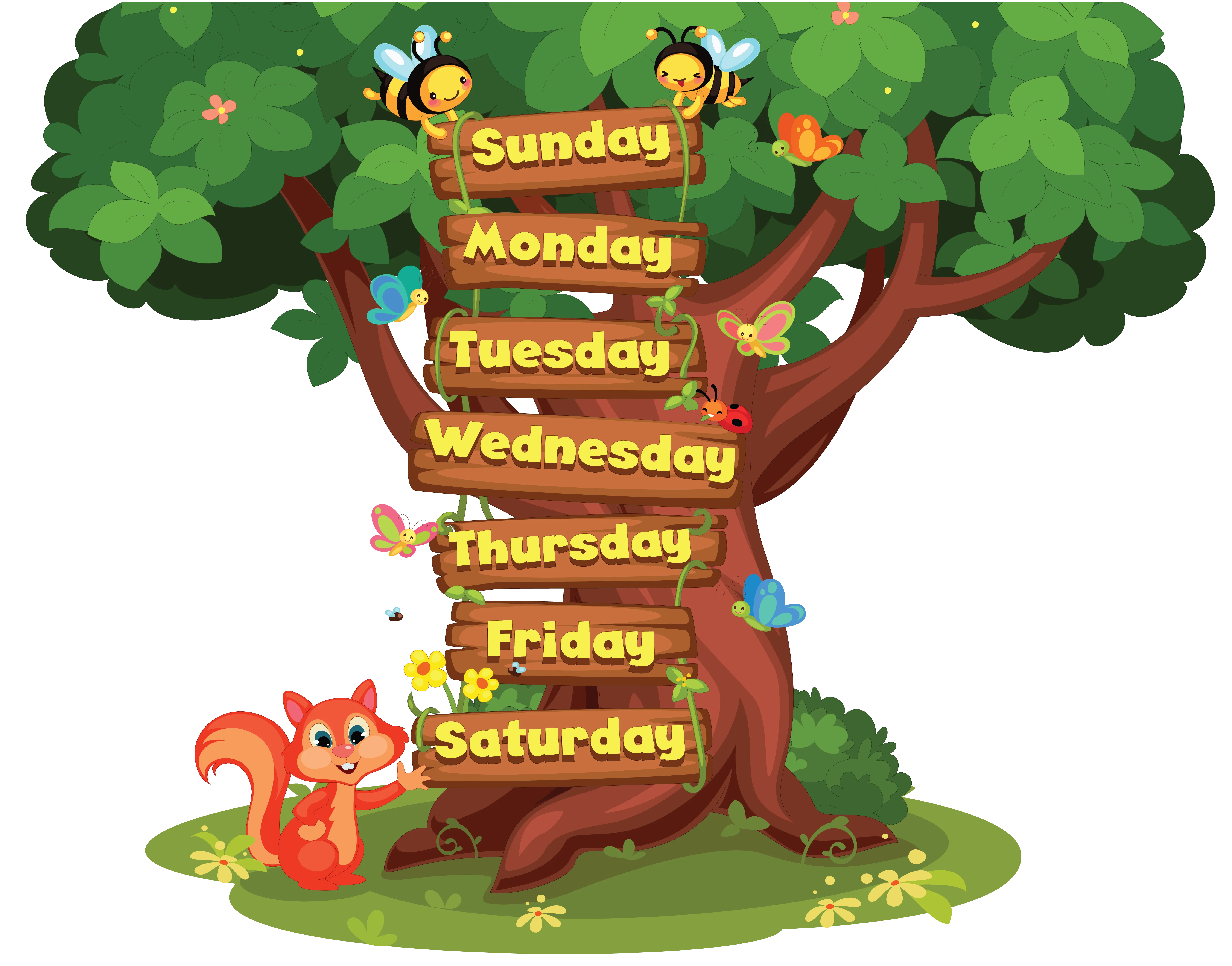
Days of the week and weekdays in English are essential guidelines for scheduling activities, joining events, or planning a birthday party.
From starting a school week on Monday to enjoying leisure on Sunday, knowing the name of each day of the week helps to handle daily tasks and activities conveniently and smoothly.
This blog closely looks at each day's name in English, explores its origin, and highlights its relevance in our daily lives.
Read more: Riddles for Kids
What is a Week Name?
A week is a span of time that consists of seven consecutive days. These seven days form a unit of time that repeats cyclically and forms the foundation of our calendar system.
The concept of dividing time into seven-day periods was started during the Babylonian and Roman civilizations. Today, this concept of a week with a seven-day cycle is used across the globe as a universal unit of time.
Name of the Week
The name of the week means the set of seven days that make up one full cycle of time. The week always includes Monday, Tuesday, Wednesday, Thursday, Friday, Saturday, and Sunday. We use the week to organize our calendar and divide time into smaller parts for ease of use.
Name of Week Days
The week has seven days, each with a special name. These days help us organize time and make plans. The seven days are Monday, Tuesday, Wednesday, Thursday, Friday, Saturday, and Sunday. People use these names every day for work, school, and holidays. Knowing the names of the days is important for daily life and communication.
Name of Days in a Week
The names of days in a week are Monday, Tuesday, Wednesday, Thursday, Friday, Saturday, and Sunday. These seven days make up one full week used worldwide. People use these names every day to talk about time, plan activities, and remember special days like holidays.
Name of Days in English
The names of the days in English are Monday, Tuesday, Wednesday, Thursday, Friday, Saturday, and Sunday. Each day’s name comes from ancient gods or planets. For example, Tuesday is named after the Norse god Tiw, and Saturday is named after the planet Saturn. These names help us keep track of days in a week.
Week Names in English
A week is made up of seven days, and together they are called the "week." The names of the week in English are used all over the world. When we know the week names, we can talk about our plans and remember important days, like holidays or birthdays.
Why does a Week Consist of 7 Days?
Some earliest civilizations, such as the Babylonians, closely observed the Moon's movements. They found that the Moon's 28-day cycle was too long to manage easily, so they divided it into four smaller seven-day weeks.
Another theory behind the origin of the seven-day week is linked to ancient astronomy. People associated each day with one of the seven visible celestial bodies: the Sun, the Moon, Mercury, Venus, Mars, Jupiter, and Saturn.
Week Days Name
The days of the week are called "weekdays." These are the names we use to talk about each day from Monday to Sunday. Knowing the week days helps us know when to go to school, when to rest, and when to play with friends.
Read more: Preposition
All Day Name of Week in English
In a week, each of the seven days has a specific name in English, which is given below.
1. Monday
2. Tuesday
3. Wednesday
4. Thursday
5. Friday
6. Saturday
7. Sunday

Also Read: Essay Writing Topics for School Students in English
Days of Week in English: Working Days vs. Weekend
The days of the week can be categorized into two groups:
-
Weekdays: These are the five days from Monday to Friday, which are used as working days or business days in most parts of the world.
-
Weekend: Saturday and Sunday, the last two days of the week, are typically considered weekend days for worship or leisure.
In some cultures or professions, the weekend may vary. For example, some Middle Eastern countries consider Friday and Saturday as the weekend.
Read more: Article Writing
Origin of the Day Name in English
The origin of the days in a week is believed to be associated with mythological characters or Gods related to celestial bodies.
Whereas most day names in English originated from their associations with the Roman gods, some were also connected to the names of the equivalent Germanic gods. Here is an explanation of how each day of the week got its name.
Monday
This name is related to the Moon and is derived from the Greek word "lunae," which means 'Moon's Day'.
Tuesday
This day is associated with Mars, named after the Germanic mythology god of war, Tiu, and is named 'Tiw's Day'.
Wednesday
The name comes from the Germanic equivalent of Roman God Mercury, named as Odin, and gets the name as 'Woden's Day'.
Thursday
Jupiter was the Roman god of thunder, and the name of this day is derived from the Norse God of thunder, Thor. So, it was known as "Thor's Day."
Friday
The Roman god of beauty was Venus, and the English name of Venus' day is derived from Frigga, the Norse goddess of love and the heavens.
Saturday
This name is closely associated with Saturn, the Roman god of art and culture.
Sunday
This day of the week is named after the Sun, and refers to the Sun.

Description of the Days of The Week
The days of the week can be described based on their relevance and importance in our daily lives.
-
Monday: It marks the beginning of the week, starting with school and work activities.
-
Tuesday: It is the day to gain momentum after the slow pace of Monday.
-
Wednesday: This day is almost the middle day of the weekdays, and is often referred to as "hump day."
-
Thursday: Thursday indicates that the weekend is approaching. Many people wrap up important weekly tasks on this day.
-
Friday: It is the last day of the weekdays. Friday evenings are popular for social outings and relaxation.
-
Saturday: It marks the start of the weekend and is usually spent shopping or doing family activities.
-
Sunday: It is considered a day of rest and worship in many cultures. It is the last day of the week and marks the weekly cycle's end.
Read more: Vocabulary Words for Kindergarten Kids, Class Wise
The day's name and weekdays in English are important information that helps manage time, plan schedules, and organize daily activities. At CuriousJr, we make learning English fun, interactive, and easy for young learners through engaging lessons and hands-on experiences.
Online English Classes with CuriousJr today and see how we help your child build a strong English foundation to excel in academics and practical life.




